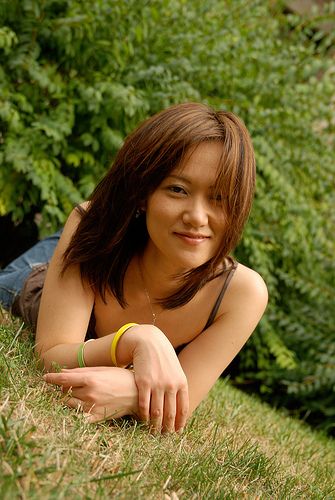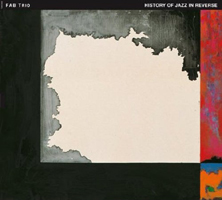Home » Jazz Articles » Interview » Yoko Miwa: New Star in an Old Sky
Yoko Miwa: New Star in an Old Sky

It is indeed special to experience her music. And paradoxically, though her music is quite easy on the ear, it is so rooted in feeling and discipline that ultimately its most loyal followers may be the weathered, seasoned jazz fanatics happy to see fleet fingers and a young face gliding over the keyboard defined in its history much by a line of persecuted, neglected and self destructive males. Miwa takes good care of herself, and with her soft, masseuse touch on the keys, makes sure she will not be ignored.
Despite the effortless sheen that tops off her style, Miwa is no stranger to labor. Classical lessons beginning at four were later supplemented with rigorous ear training, and assignments to transcribe and perform long strings of classic jazz solos. Thus her work has a complexity to it belied by its simple surface. It is as if we were looking at the still surface of a lake, and very slowly coming to recognize the nuances and shades of the water, the currents, the driftwood and the plankton. Miwa lets these details play against one another, rather than fix them to fit a defined signature style. That said, it is precisely this play that allows for surprise and the unexpected, as the tiny elements collide and clash with each other.
And despite her democratic embrace of many styles, her deep emotional sway always comes up in the end to direct the flow of song. In many cases, starting with a familiar theme, Miwa will become so lost in the feeling of that song that her solo will become a thing of its own, independent and blossoming away from the theme, but still connected and in harmony. Miwa is at a crossroads in her career, a very strong, vibrant presence on the Boston scene set to serenade a national audience. She has the gift and the right stuff. The question is how her style will unfold over time. One thing is certain. Miwa is so authentically true to herself that however her music ends up fitting itself into the trends and niche markets that characterize modern music, she will always be loved.
Light years from her stage persona, complete with diamonds and a black evening gown, is Miwa's serious, cerebral presence in person. Her reverence for the jazz tradition is deep, setting her apart from so many for whom a break with the past is the holy grail of jazz. It shows in her work. She can play the blues as if she came from the South. She explains this cultural metempsychosis.
 Frank Sinatra and Sammy Davis Jr.. So she learns the words in English. She doesn't know what she is singing, but she can sing it!
Frank Sinatra and Sammy Davis Jr.. So she learns the words in English. She doesn't know what she is singing, but she can sing it! "When I switched to jazz, Makoto Ozone was Japan's leading jazz pianist. His father is a Hammond organ player. He also plays piano but he was known for playing the Hammond organ. He was playing organ in a late-night show so everyone knew who he was. He's like Hank Jones, that kind of player. 'Don't touch my organ!,' he would say to Makoto when he left for the day; but when he came home, the organ was turned on. So he was already playing.
"The father, Minoru Ozone, my mom's friends knew him, so when I told my mom that I wanted to study jazz, my mom's friend introduced me to him. That's when I learned about his son, too. He went to Berklee and his first job was a world tour with [vibraphonist] Gary Burton."
 "Minoru—his teaching is like, 'Just listen. Copy what I play.' And the first time I went to his lesson he played this entire song, 'Tenderly.' And he played the melody, the solo, and the melody again. He gave me the tape and he said, 'Learn this by next Sunday.' I was 19, playing classical in my music college. I had technique, and I was born with perfect pitch. So I could do it, but he said, 'Don't write anything down.' So I played the tape every day, all day, and then started just note by note. It was a lot of work, memorizing six choruses of melody and improvisation. I memorized one chord at a time. The most difficult part was getting the swing feel. That's the way I learned swing. That's why I don't have a problem swinging. I see lots of Asians, we don't know how to. We don't have that in our culture." There is still the mystery of the feeling involved. "My mom listened to any kind of music even when I wasn't in her body. She loved music. So I think I got it from her."
"Minoru—his teaching is like, 'Just listen. Copy what I play.' And the first time I went to his lesson he played this entire song, 'Tenderly.' And he played the melody, the solo, and the melody again. He gave me the tape and he said, 'Learn this by next Sunday.' I was 19, playing classical in my music college. I had technique, and I was born with perfect pitch. So I could do it, but he said, 'Don't write anything down.' So I played the tape every day, all day, and then started just note by note. It was a lot of work, memorizing six choruses of melody and improvisation. I memorized one chord at a time. The most difficult part was getting the swing feel. That's the way I learned swing. That's why I don't have a problem swinging. I see lots of Asians, we don't know how to. We don't have that in our culture." There is still the mystery of the feeling involved. "My mom listened to any kind of music even when I wasn't in her body. She loved music. So I think I got it from her." "The reason I wanted to study jazz is that I heard the song 'Smoke Gets in Your Eyes,' from a movie. I was like, 'Wow, this is beautiful.' I didn't know anything about it but I liked it. And my friend said, 'That's jazz.' Then I started to research, and I went to the CD rental place. I asked a clerk which one I should listen to. He said Bud Powell and Herbie Hancock. So I got the records and brought them home but they were too out for me. I had to turn them off." Curious that she would find jazz so demanding when she was familiar with the rigors of classical. "Jazz is completely different, the sounds and voicings. But once I listened I liked it.
"In Japan everyone wants to hear a singer, like Sarah Vaughan. It's very simple music. But what I was hearing now was very new to me. Minoru's playing wasn't really like that. He was really a bebop player." Minoru made even the laborious transcription process inspiring, like putting together pieces of a mosaic. And he was floored, after two weeks of effort, to hear her achievement, which he requested she perform for people throughout his school. "He wanted to show everybody. He was really surprised He freaked out. 'Play it again!...' I became one of his favorite students, and he owned a jazz club. He played weekends. He asked me to work as a waitress, so I worked Friday and Saturday night, four or five hours, and I could listen to his band. I did that for four years, and that's how I learned real jazz. Once in a while when there weren't many in the audience he would say, 'Now Yoko, why don't you come up and play?' That was great. Also he had a radio show, and he invited me to play and for an interview."
Miwa is in her element when she performs, shining brightly, everyone loving her. "I try to stay focused. For me, the most important thing in playing jazz is focus. If my mind is somewhere else when I'm playing, I can't play anything. My mind's trying to go somewhere and I'm like, 'Oh my gosh, what am I going to do... Don't worry, don't worry, just play.'"
Some of her songs, "Wheel of Life" and "Silent Promise," are quite sad, even heartbreaking. "I like sad songs." But it is difficult when she's on stage, going down into these dark emotions, especially when she is tired, "always, and in the perfect way."
 "When I was 23 there was an earthquake in Kobe, and Minoru's music school was destroyed. I was working at the school, teaching classical, basic jazz, and accompanying singers. But we lost all our jobs and they said, 'Do what you have to do.' I thought, 'Maybe I should study jazz, now that I have time, and I found The Koyo Conservatory of Music. In my second year, the president asked me to apply for a scholarship to Berklee. I said, 'I'm not going to America!' But I changed my mind at the last minute. The Berklee professors travel all around the world to audition for this scholarship. I wanted to see how much I could do, so I just said, 'Do it,' and I won first prize. I didn't want to miss the chance."
"When I was 23 there was an earthquake in Kobe, and Minoru's music school was destroyed. I was working at the school, teaching classical, basic jazz, and accompanying singers. But we lost all our jobs and they said, 'Do what you have to do.' I thought, 'Maybe I should study jazz, now that I have time, and I found The Koyo Conservatory of Music. In my second year, the president asked me to apply for a scholarship to Berklee. I said, 'I'm not going to America!' But I changed my mind at the last minute. The Berklee professors travel all around the world to audition for this scholarship. I wanted to see how much I could do, so I just said, 'Do it,' and I won first prize. I didn't want to miss the chance." Miwa fell in love with her new country, though. She was playing so much jazz at Berklee that she developed a case of tendonitis. "I never had a problem with my hands when I was playing classical but when I came to Berklee, I played too much. I was too excited."
 Japan still holds a complex place in her heart. "I go back once a year, when I can. I missed this year. It's getting harder and harder, especially with my new seat at Berklee. I miss my family, I miss my country, I miss everything. I wish we lived closer. I would like to be there, but it just doesn't work and I want to be here, and they know that works for me. They used to say, 'Oh when are you coming back? You told me just one year.' That was my plan. They used to give me a really hard time to be in Japan, but now they see that I am enjoying what I do, they understand more and more, and they are really supportive. They gave up, basically. I want to go home as much as possible. I have connections in Japan and they book my concerts. My dream is for more back and forth, and I can see my family more often."
Japan still holds a complex place in her heart. "I go back once a year, when I can. I missed this year. It's getting harder and harder, especially with my new seat at Berklee. I miss my family, I miss my country, I miss everything. I wish we lived closer. I would like to be there, but it just doesn't work and I want to be here, and they know that works for me. They used to say, 'Oh when are you coming back? You told me just one year.' That was my plan. They used to give me a really hard time to be in Japan, but now they see that I am enjoying what I do, they understand more and more, and they are really supportive. They gave up, basically. I want to go home as much as possible. I have connections in Japan and they book my concerts. My dream is for more back and forth, and I can see my family more often." In Miwa's work, the tradition is fore-grounded and her own style is set in a detailed way, though heavily, in the background, almost a reversal of the two. This is akin to Japanese art, where nature exists on a much grander scale than man. The jazz tradition, which goes back in time four centuries through slavery—she puts herself in a humble place within that, but a very strong one nonetheless. "I always respect where it comes from, so I always like to learn from the jazz tradition." Even when she dips into traditional Japanese songs with "Red Dragonfly" on her debut CD, In the Mist of Time (Tocuma, 2001), "I played it with a bluesy gospel feel rather than a traditional Japanese one."
That said, she is very much part of a generation including Vijay Iyer, Craig Taborn, and John Medeski. She also loves Brad Mehldau, but feels too many try to copy him. "Still I like swing, Oscar Peterson," and her grand elegance is even reminiscent of Teddy Wilson. "I cannot decide exactly my style. I want to mix it, and I kind of worry, 'Is this weird?' But still, it's my song, there's nothing weird about it."
She has a broad palette, dipping into everything from the meanderings of Chopin to Aerosmith's "Seasons of Wither." "I'm always looking for something new. I like the standards, and I like to play my originals, but I am always searching. The Aerosmith song—I always liked that song but I never thought I'd play it, until I was surfing YouTube. 'It's kind of pretty,' I thought. 'Maybe I'll do it as a solo piano.' But we had a show and we were doing a rehearsal and I thought, 'Maybe I'll do this song as a trio.' I just wanted to see how it sounded, and it came out really good. I want Steve Tyler to listen to it. It seems like everybody loves it."
Bill Evans is always her hero. "It never changes. He also came from the trio tradition. I felt a similar process in my work." But where both are still and peaceful on the surface, Evans stays still all the way through, while Miwa has a core that is disturbed and passionate. "I like his kind of sadness. I feel very connected to him through that bittersweet sadness."
 When she improvises, she does so with passionate exploration. It's always a surprise and guessing game where she will go. "As long as I'm in the role, when we are playing really good—we always talk about this as musicians. We believe we are somewhere else. Nothing can go wrong when you are in a zone. Something happens. Someone was telling me, 'That's not us. It can't be!' Because we cannot control... I'm so fortunate to have that moment that I don't question the mystery, just accept it as a gift."
When she improvises, she does so with passionate exploration. It's always a surprise and guessing game where she will go. "As long as I'm in the role, when we are playing really good—we always talk about this as musicians. We believe we are somewhere else. Nothing can go wrong when you are in a zone. Something happens. Someone was telling me, 'That's not us. It can't be!' Because we cannot control... I'm so fortunate to have that moment that I don't question the mystery, just accept it as a gift." Its technical precision notwithstanding, Miwa's work inspires mind play and metaphors. Described as having "the lyric sensibility of a jazz poet," she enters her waters like a naked pearl diver. Handling the blues she is like a little Latina girl rolling a macho, Cuban cigar. For all this, she is also much like a keeper of a Japanese garden, mixing in foreign and hybrid plants. "I need to have the mood to compose," she says. It's not like I can say, 'I have to compose now.' I try, sometimes and force myself, but it doesn't work. Sometimes like working around the house, outside, looking at the beautiful sky or try to relax, just get in the mood for it, then I get something."
 Greg Loughman on bass, and Scott Goulding on drums. On a first listen, these two seem barely audible, sensed only like the ripples representing the current on the surface of Miwa's playing. Listened to more closely, things are more complex. Goulding even goes quite mad on drums at times. This demonstrates the depth and suppleness of their communication. The trio is perfect together. "I met Scott at Berklee. He had already graduated. He was playing in one class I was attending, [pianist] JoAnne Brackeen's class. And there was a rhythm section and each week we had to choose a song from a CD to transcribe and play with the rhythm section. The day when I performed my first song, the bassist didn't show up, so it was just me and Scott.
Greg Loughman on bass, and Scott Goulding on drums. On a first listen, these two seem barely audible, sensed only like the ripples representing the current on the surface of Miwa's playing. Listened to more closely, things are more complex. Goulding even goes quite mad on drums at times. This demonstrates the depth and suppleness of their communication. The trio is perfect together. "I met Scott at Berklee. He had already graduated. He was playing in one class I was attending, [pianist] JoAnne Brackeen's class. And there was a rhythm section and each week we had to choose a song from a CD to transcribe and play with the rhythm section. The day when I performed my first song, the bassist didn't show up, so it was just me and Scott. "Greg I met at a jam session I used to go to in Newton, Mass., an old guy who played saxophone. He had a session everyday during the day at his house. So I used to go every week, and one day he was there. I thought he was a great bassist. It's really hard to find one, a good one who will understand my playing. It doesn't mean a great bassist, a great drummer, will work with me. We have to work together and they have to understand my music and my playing and my background."
Miwa also has a fine sense of how to weave her own playing through that of Loughman and Goulding, suggesting a possible skill with larger scale bands. "At Berklee I wanted to do a big band arrangement, or something with strings. But I stopped doing anything else and wanted to just concentrate on piano trio. That's my favorite jazz setting. I still enjoy listening to the trio setting the best. Whoever I'm listening to I love the trio." Very cautious and methodical, she takes her future one step at a time.
"I am always thinking about the audience. I'm not really like, 'Me, me, me, me, me.' I don't like when I go to a concert and they're having a great time but there's no connection with audience. I'm always thinking, 'How do they feel about this song?' I am always thinking about the songs list. We cannot decide what we will play until that moment, so we pick one by one. And we see the audience is talking, or they're partying, or they're listening. Maybe they want to be happy, or maybe more quiet. So you have to see what's going on. Some people cannot do that. That's very important for a professional musician."
 Miwa works in the grand style, the classic style. But she is an innovator as well, working within the tradition, mixing elements, letting the music follow new courses, which could lead anywhere. In a modern world where business is premium, everyone wants inside information on where an up and coming star will go next. Miwa has the potential to move in many directions. One can see her working multiple projects, being very prolific. For now she wants to stick to her trio. "I want to write my songs, of course. That should be my main thing." She wants to take things one step at a time. "I cannot plan that." Having just released her fifth CD, Live at Scullers (Jazz Cat Amnesty, 2001), she has plans to hit the festival circuit and world tours. "I want to meet more new fans."
Miwa works in the grand style, the classic style. But she is an innovator as well, working within the tradition, mixing elements, letting the music follow new courses, which could lead anywhere. In a modern world where business is premium, everyone wants inside information on where an up and coming star will go next. Miwa has the potential to move in many directions. One can see her working multiple projects, being very prolific. For now she wants to stick to her trio. "I want to write my songs, of course. That should be my main thing." She wants to take things one step at a time. "I cannot plan that." Having just released her fifth CD, Live at Scullers (Jazz Cat Amnesty, 2001), she has plans to hit the festival circuit and world tours. "I want to meet more new fans." One question is, coming from a culture where humility is valued, will she ever embrace the brasher, more self-asserting American model of the public artist that tends to bring so many so much success, from Madonna down. Again, she is committed to the tradition. Bold innovations are bound to ensue, but they will be waves lapping the shores of her placid lake, burning with flora and fauna, in a village jazzed up for a jaded, down and out populace, alive and dancing, brightening the darkening days.
Selected Discography
Yoko Miwa Trio, Live at Scullers Jazz Club (Jazz Cat Amnest, 2011)
Yoko Miwa Trio, The Day We Said Good Bye (Sunshine Digital, 2008)
Yoko Miwa Trio, Canopy of Stars (Polystar, 2005)
Yoko Miwa Trio, Fadeless Flower (Polystar, 2003)
Yoko Miwa Trio, In the Mist of Time (Tokuma, 2001)
Photo Credits
Page 1: George Lloyd
Page 3, Bottom: Liz Linder
All Other Photos: Jaime Clapp
Tags
Yoko Miwa
Interview
Gordon Marshall
United States
frank sinatra
Sammy Davis Jr.
Makoto Ozone
Hank Jones
Gary Burton
Bud Powell
Herbie Hancock
Sarah Vaughan
Vijay Iyer
Craig Taborn
John Medeski
brad mehldau
oscar peterson
Teddy Wilson
Bill Evans
Greg Loughman
Scott Goulding
Joanne Brackeen
PREVIOUS / NEXT
Yoko Miwa Concerts
Support All About Jazz
 All About Jazz has been a pillar of jazz since 1995, championing it as an art form and, more importantly, supporting the musicians who make it. Our enduring commitment has made "AAJ" one of the most culturally important websites of its kind, read by hundreds of thousands of fans, musicians and industry figures every month.
All About Jazz has been a pillar of jazz since 1995, championing it as an art form and, more importantly, supporting the musicians who make it. Our enduring commitment has made "AAJ" one of the most culturally important websites of its kind, read by hundreds of thousands of fans, musicians and industry figures every month.





















